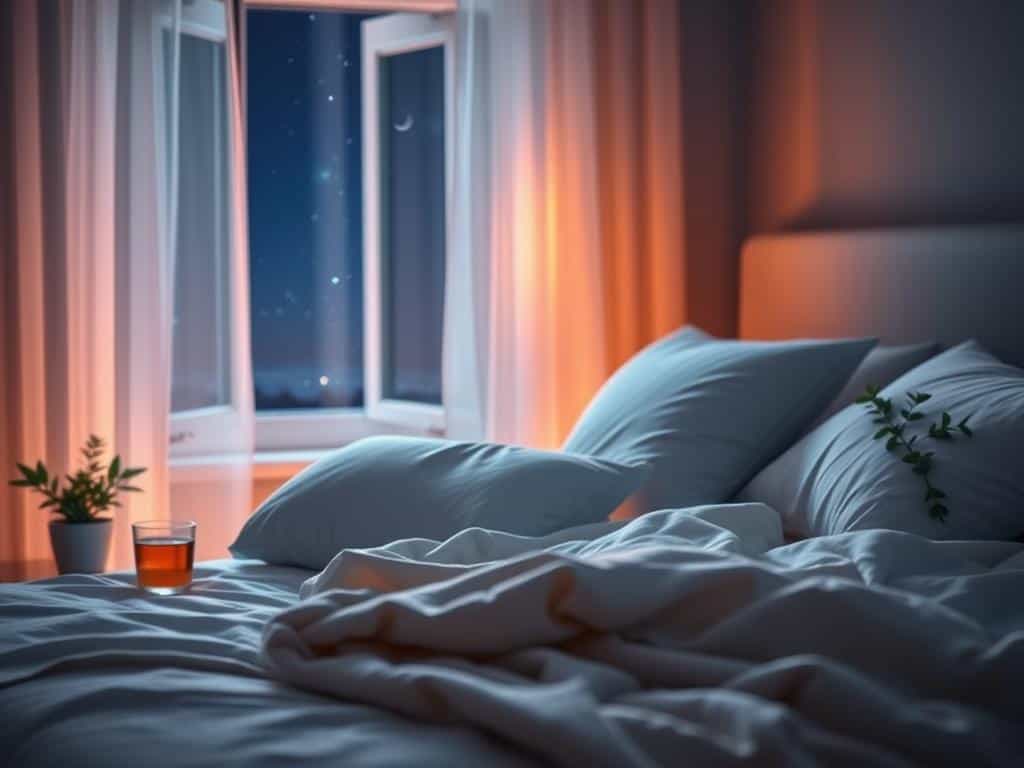Did you know 84 million adults in America have trouble sleeping well? This info comes from the Casper-Gallup State of Sleep in America 2022 Report. Sleeping well is crucial for staying healthy and feeling good. The National Sleep Foundation suggests adults need 7 to 9 hours of good sleep every night. Even with this knowledge, many find it hard to fall asleep. Let’s look at some tips to help you sleep better.
Creating a regular bedtime routine has helped me sleep better. Keeping a clean sleep environment is key. It’s important to avoid drinks like alcohol and coffee before bed. Also, doing some exercise can help you fall asleep faster. Let’s try these tips together and have the best sleep ever!
Key Takeaways
- 84 million adults in America face challenges with quality sleep.
- 7 to 9 hours of sleep is key for optimal health, as per the National Sleep Foundation.
- Consistent sleep schedules help in developing better sleep routines.
- Avoiding alcohol and caffeine before bedtime can enhance sleep quality.
- Regular exercise can significantly improve sleep quality for adults.
- Small changes in the sleep environment can lead to major improvements in sleep.
Understanding Quality Sleep
Quality sleep is key for our health. It affects how our body works. Getting enough sleep is not just nice to have; it’s necessary. Most adults need 7-9 hours of good sleep every night. This kind of sleep helps our mind, feelings, and body health.
The Importance of Sleep for Health
Sleep is super important for our health. It helps our mood and immune system. Not sleeping enough can lead to serious health problems like Type 2 diabetes and heart disease. Sleeping well also helps our metabolism. Making sleep a priority is vital for anyone wanting to be healthier.
What is Quality Sleep?
Quality sleep means sleeping deeply enough for the right amount of time. It means not waking up a lot, so we go through deep sleep cycles. Waking up feeling refreshed shows we slept well. But, many adults, about 84 million, can’t get this kind of rest. This can make problems like weight gain and poor blood sugar control worse. Knowing what good sleep looks like can help us sleep better for our health.
Sleep Better: Effective Hacks for Restful Nights
Making my sleep better is now a top goal. To do this, it’s key to stick to a set sleep time. Sleeping at odd hours can mess with the quality of my rest. It makes falling asleep and waking up hard.
Having a fixed time to sleep and wake up supports my body’s natural clock. This helps me fall asleep smoothly. I aim for at least seven hours of sleep to feel refreshed the next day.
Establishing a Consistent Sleep Schedule
To keep my sleep schedule regular, I avoid caffeine after noon. Studies show it can greatly cut down how long I sleep. Sticking to a bedtime routine also boosts how well I sleep.
My routine includes setting my bedtime for two hours post-dinner and avoiding bright screens. Doing calm activities before bed makes falling asleep easier. I tweak my schedule a bit to find what fits me best.
Creating a Relaxing Nighttime Routine
Setting up a nightly routine helps my body know it’s time to relax. I focus on soothing activities like reading or meditation. These align with sleep expert advice for a restful night.
Steering clear of tough workouts before bed is also crucial. Cutting out caffeine and screen time an hour before sleep assures a calm night.

Optimizing Your Sleep Environment
Creating the perfect sleep setting significantly impacts how well I sleep. The temperature, light, and noise in the bedroom are critical factors. Making changes in these areas has helped me enjoy more restful nights and improved sleep quality.
Controlling Bedroom Temperature
It’s important to keep your bedroom at the right temperature for good sleep. Experts suggest that around 65 degrees Fahrenheit is ideal for sleeping. A cooler room aids my body in entering deeper sleep stages, which are crucial for rejuvenation.
Adjusting my thermostat to be between 60 and 67 degrees Fahrenheit makes a big difference. It helps me relax and fall asleep quicker.
Minimizing Light and Noise Disruptions
I also focus on managing light for better sleep. Natural light is great during the day, but I avoid it at night. Using blackout curtains or an eye mask helps block out light, ensuring it doesn’t interrupt my sleep. Noise can disrupt sleep as well.
I often use white noise machines or earplugs to keep noise levels down. This helps me sleep more soundly, without waking up often. These changes have made my sleeping area a peaceful place for rest.
Conclusion
Thinking about the main points in this article shows how important good sleep is for our health. Many adults in the U.S. don’t get enough sleep. This happens almost half the month for most. Not sleeping enough can lead to many health problems. Getting seven to nine hours of sleep every night is really important.
Trying out the sleep tips we talked about can change how you sleep. Doing things like keeping a regular bedtime and having a relaxing routine before bed can help a lot. Good sleep makes you think clearer and do better in your day. It also keeps your immune system strong and lowers the chance of getting sick with things like obesity, diabetes, and heart disease.
Sleeping well is more than just feeling okay the next day. It’s about keeping yourself healthy overall. By paying attention to what we do and the setting around us, we can sleep better. Quality sleep is key to living a healthy and active life.